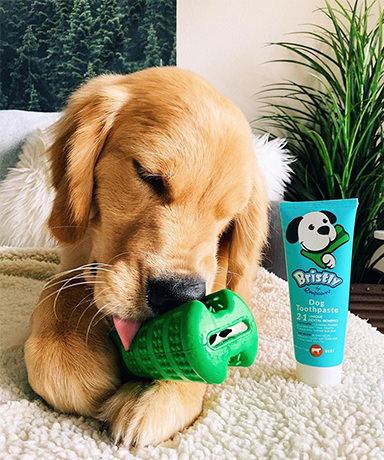Your Cart is Empty

Time to make your inbox pawsome
Sign up today and get 10% OFF your first purchase!


Chances are, you don't know what the ingredients are in your toothpaste - well, maybe other than fluoride - and you probably don't know what's in your dog's toothpaste, either. While brushing your dog's teeth is still the best way to prevent plaque, tartar accumulation, and gingivitis, there are some ingredients in dog food and treats that offer oral health benefits.
Here are five ingredients in dog food and treats that can help improve your dog's dental health:
Don't be scared away just because this sounds like something right off the periodic table. Amyloglucosidase, or AMG, is an enzyme that breaks starch down into glucose. Breaking down those starches into simpler sugars can positively affect your pup's oral health simply by cutting down the complex sugar in their mouth that can accumulate to form plaque and eventually harden and turn into tartar. In addition, AMG will work with the amylase, an enzyme naturally found in saliva, to break down the sugars your dog consumes, yielding the same result. When AMG was tested in toothpastes, it was shown to have an effect on plaque reduction in the mouth and along the gumline of patients. When used as an ingredient in dog treats, it will have a similar effect.
There has been research done on the effects of cranberry seed oil and its ability to prevent kidney and bladder infections by blocking bacteria from attaching to the tissue. This is most likely because of the proanthocyanins (a type of polyphenols) found in cranberries which impede the formation of bacteria. If you're thinking, ‘But wait! Bacteria is one of the reasons plaque forms on teeth!’ I'm way ahead of you - by this same logic, cranberry seed oil can also be an effective way to prevent plaque and tartar buildup on teeth by fighting those bacteria. Not only does cranberry seed oil contain bacteria fighting proanthocyanins, but it also contains forms of Vitamin E.
We've talked about the plaque fighting ingredients found in your dog's treats, but they can also contain ingredients that help to combat periodontal disease. Like has been previously mentioned, a lack of oral hygiene in your pup can lead to some nasty consequences (and we're not just talking about bad breath, here). Vitamin E is a fat-soluble vitamin that prevents critical chemicals in the body from oxidizing. The Office of Dietary Supplements says that Vitamin E can fight bacteria by strengthening the immune system. This can help your pup's gums by the immune system getting to that bad bacteria before it has a chance to accumulate in the gums and result in gingivitis. Additionally, Vitamin E has the ability to heal damaged body tissue, which can come in handy if your dog is already experiencing some early signs of periodontal disease. Other vitamins that can enhance the immune system and heal damaged tissue are Vitamins C, A, and D.
Coenzyme Q 10, or CoQ10, is an essential molecule that the body relies on for the mitochondria to produce adenosine triphosphate, or ATP. (Am I the only one having high school biology flashbacks?) Not only is it fundamental on the cellular level, but CoQ10 can prevent the decline of gum health by slowing collagen loss. In addition, it can even help to heal gums with more advanced stages of periodontal disease. Gums that have some stage of this disease almost always have a deficiency of CoQ10, but increasing the amount of CoQ10 your dog ingests can help by reducing the pocket depth in gums with mild to severe periodontal disease.
Hailed as a "miracle" natural remedy for pain in humans ranging from arthritis to osteoporosis, and headaches to Crohn’s disease, Methylsulfonyylmethane or MSM, has also been used in oral care. MSM is a sulfur compound that occurs naturally in specific types of plants. Not only can it help with tooth pain and sensitivity, but it has also been used to treat gum disease due to its ability to reduce inflammation. As you may already know, gingivitis happens when bacteria migrates under the gumline, and eventually release toxins which can irreversibly damage the gums. MSM helps to reduce this inflammation by suppressing the production of a specific protein complex that triggers inflammatory responses in the body. As an ingredient in your dog’s food or treats, it may help to reduce swelling in their gums, and to relieve tooth sensitivity that you may not even be aware of. Of course if your dog is in severe pain, it is always best to consult a vet and always get their teeth checked at least once a year.
For dog treats that fight gum disease, check out our Bristly Pre-Biotic Dental Treats!
